|
|
| Notes from the Director of Music |
|
After what seemed like a very long summer break the Band is now back and in full flow getting ready for a busy period of concerts in the run up to Christmas.
Before getting into the details of our concerts though I need to tell you that we were most fortunate to be awarded a grant by East Midlands Airport; the money has been used to purchase more staging to help present the band during our concerts. We are most grateful to East Midlands Airport for the award. |
|
Our first concert is on Saturday 2nd November at the Palace in Ibstock. We have been giving an annual concert in Ibstock since 2000 and it is always a pleasure for us to perform at the Palace. The programme of music is 'music from the musicals'. The band will be playing a great selection of pieces from musicals like Les Miserables, Miss Saigon, Phantom of the Opera, The King and I, Oklahoma, Fiddler on the Roof, Mary Poppins, Oliver and Carousel.
Less than a week later on Friday 8th November we will be repeating the Ibstock concert at Holy Trinity Church in Ashby de la Zouch; we have decided to change the format of our annual concert in support of the Royal British Legion Annual Poppy Appeal. |

|
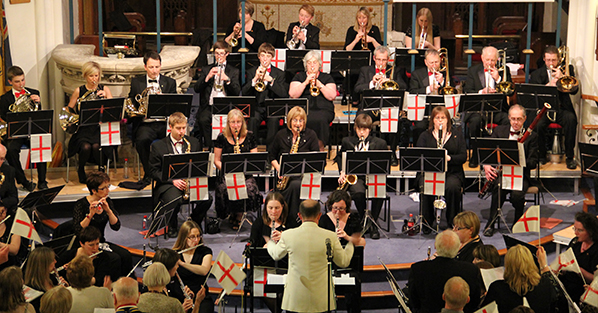
ACB performing Elgar's Pomp & Circumstance No.1 - Land of Hope and Glory
St George's Day Concert - April 2013
|

|
On December 14th we will once again be performing our annual Christmas concert at Holy Trinity Church. You can expect to hear many of those traditional Christmas favourites along with a few surprise pieces that will compliment the festive mix.
Next year, 2014, on Saturday 11th October we will be performing our first concert at St. Helen's church in Ashby de la Zouch; we are hoping to help the church raise much needed funds for the rennovation and modernisation of the church cottages. The programme of music will be popular classical including some solo pieces to feature a few of the instruments in the band. I'm not going to reveal everything at this stage but we will perform the Marcello Oboe Concerto with our Principal Oboe player Laura Storer performing the solo part. There will also be at least one first time performance - the Triumphal March from Aida by Verdi. It is going to be a night not to miss so be sure to make a note in your diary now!
At the beginning of November we hope to be performing our annual Poppy Appeal concert; this will be a particularly important occasion because it will be the 100th Anniversary of the outbreak of the 1st World War. I am confident we will be performing with our good friends the Seaforth Highlanders and we will be performing some well known favourites along with some new and exciting pieces.
One final thing, Ashby Concert Band now has a Facebook page. We want to use our Facebook presence to spread the word about ACB and all the good work the band does in keeping music live in the community, performing concerts to help local and national charities raise money, and most importantly, providing a forum for local musicians who play woodwind, brass and percussion instruments to develop their playing and enjoy making music in a friendly and supportive environment. Please visit ACB on Facebook and if you like what you see then please 'Like' our page. |

|
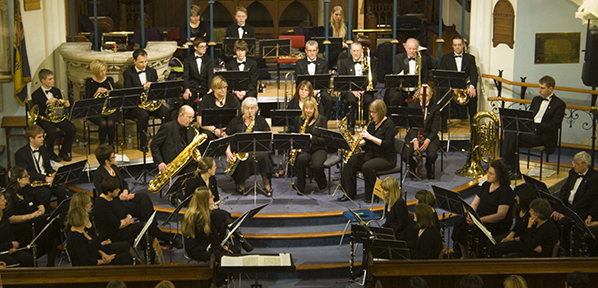
Quintessential Sax performing with ACB - The Girl With The Flaxen Hair
Leicestershire & Rutland Wildlife Trust Concert - March 2013
(one of those rare occasions when the MD gets to play) |

|

|
| Portrait of a Player |
|
For this edition of Notations we have decided to turn the spotlight onto another one of our brass players –David Wilkinson.
David was born in Chesterfield and spent the first six years of his life just outside Stavely. The family then moved to a small village in the Peak District, where David spent the rest of his childhood. Until he was eleven David had no interest in music apart from singing a bit at school. It was in his final year at primary school that David sang a solo in the pantomime. Fortunately for him, a music teacher from the secondary school was in the audience. Upon arrival at the new school the following autumn, he assumed David could already read music and handed him a trumpet! |
|
So, at the age of eleven, with no music knowledge whatsoever David had to pretend he knew what he was doing. A few months later saw the end of free music provision in Derbyshire but by then David was hooked and his parents agreed to keep forking out for the lessons.
It rapidly became clear though that David could not achieve the required range on a trumpet and so moved down to a tenor horn. The same thing happened with that and David went further down the scale to euphonium before landing, or bottoming out, on the Eb bass or tuba. During his school years David played in various bands eventually being in seven at the same time: the school wind band, brass band and orchestra, the area wind band, the Matlock Brass Band and the county youth wind band and orchestra. Both the school and county wind bands won the National Festival during this period so David had the privilege of playing several times in the Royal Festival Hall and twice in the Royal Albert Hall. There were also tours with the bands to such places as Germany, the Netherlands and even Israel, where the band had to go everywhere with an armed escort!
With a tuba Grade 8 in his pocket David went to Newcastle University and kept his hand in by playing in the University Orchestra, while getting a degree in Physics with Medical Applications. David went to work for the then Police Scientific Development Branch of the Home Office, initially in the less-lethal weapons programme, and became a leading expert on TASERs. After four years he moved into volume crime and then counter-drugs technologies. Whilst living in the south east David played euphonium for the Watford Brass Band and tuba for the Hertfordshire county wind band.
In 2007 David took a job as Midlands Regional Officer for the Institute of Physics and moved to Ashby, joining ACB within a few weeks of getting here. As well as his IOP job, David is now a Chartered Physicist and a visiting fellow in science and technology at Nottingham Trent University, specialising in forensic physics. David fills his spare time with raising two children (8 and 5), being a governor at Ashby Hilltop School and writing. Having completed his first novel (several chapters written on the bus during the band's tour to Pithiviers last year) David has secured a publishing deal and the book will be out in paperback and e-book next summer! (Plug, plug, plug).
|

|
|
Vibrating Reeds |
 |
To make a hollow cane into a musical instrument just cut a short length, flatten or slice through one end and bore a few holes! Although it will produce little more than a squawk this primitive pipe is the ancestor of all reed instruments. The distinctive reedy sound is caused by a vibrating slice of cane called a beating reed. The result is a variety of sounds that range from the liquid notes of the clarinet to the plaintive tones of the oboe, and the gruff undertones of the bassoon. |
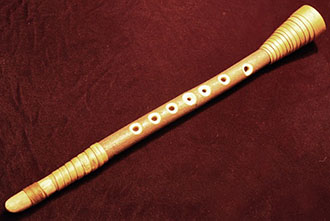 |
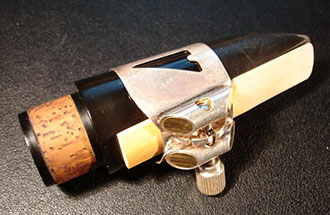 |
Single reed instruments include the clarinet and saxophones which are played with a mouthpiece fitted with a ligature which holds a single reed. The players mouth can influence the vibration of the reed to produce individual tones. |
Clarinets were developed during the 18th century and the somewhat awkward early key systems were improved by Boehm about a century later. The name clarinet was inspired by the fact that the high notes suggested the sound of the trumpet or clarino. The sound, both shrill and sweet, is widely used in orchestras and concert bands. The picture shows the clarinets you might expect to find in a concert band, although it is rare to find a C clarinet. There is also an A clarinet but this instrument is more commonly found in an orchestra. (See note below about transposing instruments). |
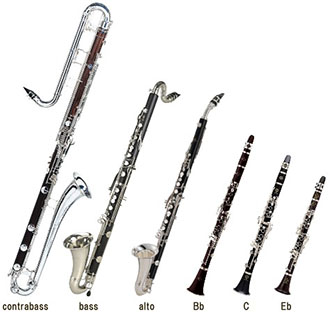 |
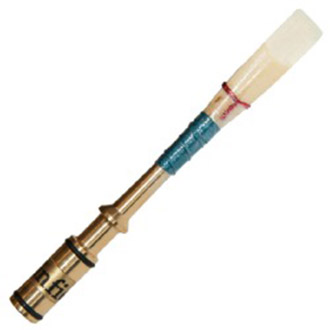 |
Double reed instruments include the oboe, bassoon and cor anglais. Two slices of reed (from the same reed) make up the double reed which vibrate to sound the column of air in the body of the instrument. The double reed and conical tube give the piercing and somewhat nasal sound characteristic of the oboe, cor anglais and bassoon.
Interestingly, this 'double reed' is actually made by taking a single reed, folding it in half, binding the end together and then cutting the folded end to reveal a small opening. The reed is attached to the staple and then to the crook. |
"A sea god speaking" is how the writer Sacheverell Sitwell described the sound of the bassoon. The bassoon consists of a wooden tube measuring some 2.7 metres in length which doubles back on itself within the body of the instrument. Unlike other members of the woodwind family the bassoon has undergone very little development of its keywork system and it is notoriously difficult to play, indeed it is the only instrument where both thumbs are actively involved in playing keys (typically five keys per thumb!) rather than just supporting the instrument with the right thumb and playing at most two keys with the left thumb, as is the case with the oboe, flute, clarinet and saxophone. |
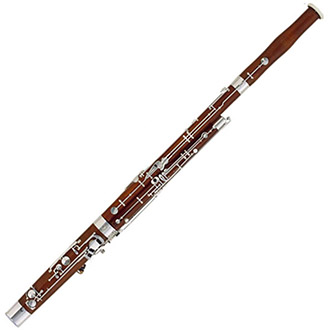 |
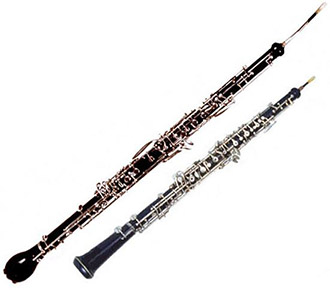 |
The cor anglais is a low pitched oboe with a soft, sad sound. The instrument was originally curved much like a hunting horn; it was in the 19th century that the curve hardened into an angle. The french name "cor anglais" translates to English Horn but no one is sure where the English came from. The characteristic velvety tone is due in the main to the bulbous bell at the end of the instrument. The keywork of the cor anglais is essentially identical to the oboe so it is typical for oboe players to also play cor anglais, and vice versa.
The oboe descends from the shawm, a simple pipe fitted with a double reed common in folk music. The name derives from "hautbois", the French name for shawm, which means "high wood". The oboe is renowned for its high plaintive tones. |
Clarinets, like many of the instruments in a concert band, are what are called transposing instruments. You may well remember from your school days playing the ubiquitous recorder. You may also remember that if you played a descant recorder the fingering was different to the treble recorder, but surprisingly the same as the tenor recorder. The difference in size between recorders determined the pitch range of the instrument. It would make no sense in a orchestral environment if the clarinet player could only play one instrument in the family of instruments, so to simplify matters all clarinets have the same fingering for a given note and that is because clarinets are either Bb or Eb transposing instruments so playing C on a Bb clarinet produces the note concert Bb whereas playing C on an Eb clarinet produces the note concert Eb! To make it possible for the instruments to play in the same key they must each have their own music written in an appropriate key transposed from the concert pitch key signature. The flute, oboe and bassoon each play in C so can play directly in the key signature of the piece of music, whereas the cor anglais plays in F so needs to have its music transposed. Any questions? If confused go to Wikipedia and either be enlightened or more confused. Good luck! |
 |
| Date for your Diary |
2nd November 2013
'Music from the Musicals' - The Palace Theatre, Ibstock - 7.30 p.m.
A concert of music from the musicals, including Miss Saigon, Mary Poppins, Oliver, Les Miserables and Carousel. |
8th November 2013
Poppy Appeal Concert - Holy Trinity Church - Ashby - 7.30 p.m.
ACB is pleased to perform a concert to raise money for the Royal British Legion Annual Poppy Appeal. The programme of music will showcase some of the best of music from the musicals. |
14th December 2013
Christmas Concert - Holy Trinity Church - Holy Trinity Church, Ashby de la Zouch - 7.30 p.m.
The perfect way to start your Christmas celebrations, complete with festive fayre. |
|

|
Supporters Acknowledgements |
| Ashby Concert Band is especially grateful for the continued and extended support of our Patrons: |
Mrs M Tuckey
Mr & Mrs K Spencer
Mrs M Ross
Joan Hardwick
Kay Stephens
Alan Tricker
Mr J Towers
|
Mr H K Berry MBE & Mrs C Berry
Mr & Mrs J Backhouse
Mr Derek & Mrs Teresa Hayes
Mr & Mrs D Thompson
Richard & Sharon Tapping
Mr A Holland
|
and for the assistance given to the band by Johnson, Murkett & Hurst, Accountants of Ashby de la Zouch. |
|
|

|

|
Ashby Concert Band
Registered Charity no. 1112173
|
|
|